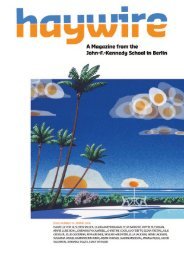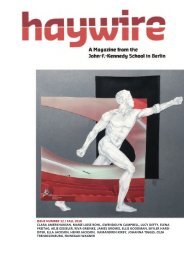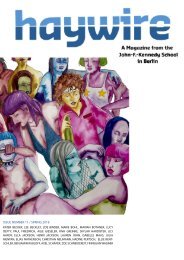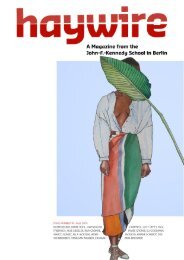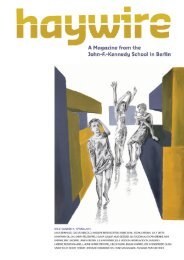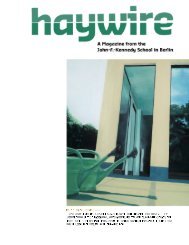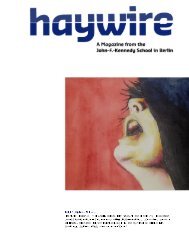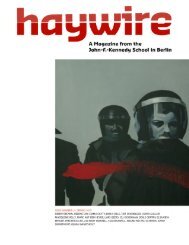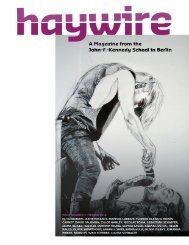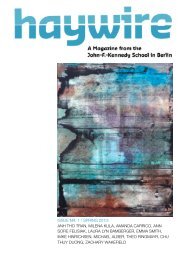Haywire Issue 4 Fall 2014
- No tags were found...
Create successful ePaper yourself
Turn your PDF publications into a flip-book with our unique Google optimized e-Paper software.
Shards of Memory<br />
Interview With a Former GDR<br />
by Naomi Plitzko Scherer, 10d<br />
My laptop speakers crackle and pop, Helmut’s Saxon<br />
accent, a familiar tone from my childhood, distorted<br />
further by Skype’s unsatisfactory quality. Even before<br />
I begin, I experience a sense of failure, by not<br />
giving his life story the clarity it deserves. While exchanging<br />
the necessary pleasantries, I mentally prepare<br />
myself, attempting to overcome my set predictions<br />
of what his opinion on the GDR will be. At the<br />
same time, I am already steeling myself to rediscover<br />
people I have known my entire life.<br />
As if he can sense my worry from the other<br />
side of the city, Helmut comments several times on<br />
the tinny quality of the call, perhaps worried his existence<br />
will be misunderstood. Soon, and without much<br />
prompting, he launches into the tale of his youth in<br />
the GDR, attending an elementary school in Dresden<br />
for eight years before foregoing the diploma in favor<br />
of a “Berufsschule” (vocational school) in Leipzig<br />
but later rectifying this decision in Leverkusen, West<br />
Germany. He strove to escape his authoritarian father,<br />
knowing supplying his own livelihood would buy his<br />
freedom. While explaining his childhood to a computer<br />
screen, Helmut Franz frequently comments on<br />
the lack of political fanaticism, like he can read my<br />
preconceptions from my silence, frantically trying to<br />
escape the stereotype. He mentions how his mother’s<br />
unwillingness to let him join the children’s organization<br />
the “Pioniere” was accepted without discussion.<br />
Although, as he hurries to add, this could have been<br />
quite different elsewhere. “The school was called the<br />
Berufsschule Freie Jugend (the Vocational School<br />
Free Youth) and was located in Stalin Street,” Helmut<br />
explains. “In spite of this beautiful title and the street,<br />
our vocational school education was very qualitative,<br />
systematic, and objective, a very good education.”<br />
But even after he seems to have convinced himself of<br />
the livability of the GDR, Helmut imparts his desperate<br />
dream of fleeing to West Germany.<br />
In 1967, at age 18, he left through Leipzig<br />
while it was still easy to leave. In fact, he escaped<br />
in May, a mere two months before the Wall became<br />
impassable, cutting short his vacation at the Baltic<br />
Coast like he could sense the electricity in the air<br />
before the coming storm. Helmut and his friend at<br />
the Berufsschule had long admired the West-German<br />
cars, all chrome and dual paint finishes and white<br />
stripes and luxury, so different from the rickety “Trabis”<br />
East Germans had to wait 15 years to acquire.<br />
HAYWIRE <strong>Issue</strong> 4 <strong>Fall</strong> <strong>2014</strong><br />
Art by Maria<br />
Schubert, 12a<br />
25







